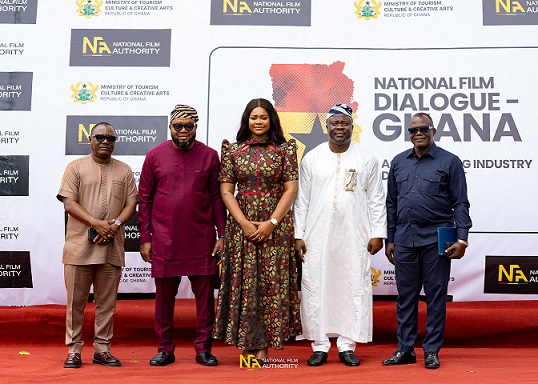The National Film Authority (NFA) has launched the first National Film Dialogue in Accra, aimed at finding solutions to the industry’s challenges. Held on September 16 at the University of Ghana’s Cedi Conference Centre, the event brought together leading figures in Ghana’s film space and government officials, underscoring the importance of partnerships for the sector’s growth.
The dialogue, themed “Accelerating Industry Development,” featured keynotes, panel sessions, and stakeholder consultations.
NFA Board Chairman, Mr. Ivan Quashigah, reiterated the Authority’s commitment to reviving Ghana’s film industry, citing the new “1% of Ghana’s population” initiative.
He praised the country’s cinematic legacy but stressed ongoing challenges like financing, infrastructure gaps, and barriers to entry for young filmmakers.
He stressed the need to use communication tools and creative resources to drive growth in the industry, recommending new policies, tax breaks, and private-sector collaborations to make Ghana’s film industry both profitable and internationally recognized.
According to Quashigah, even engaging 1% of Ghana’s population could generate ₵16.5 million in box office revenue, highlighting the market’s potential.
Quashigah unveiled plans to boost Ghana’s film culture, including mobile cinemas, school programs, corporate sponsorship, and film passports. Cabinet is reviewing draft policies on tax incentives.
He highlighted the need for accurate data and higher-quality productions to measure progress and attract global partners. Reviving the industry, he said, is not just about entertainment but also job creation, cultural heritage, and tourism.
Representing the sector Minister, Hon. Yussif Issaka Jajah, Deputy Minister for Tourism, Culture, and Creative Arts, reaffirmed the government’s dedication to building a thriving film industry in Ghana.
“Film is not only entertainment but a mirror of our society, a vessel of our heritage, and a bridge to the world. Our stories deserve to be told, across Africa and beyond,” he stated.
Hon. Jajah emphasized the government’s vision of making the Creative Sector a cornerstone of economic transformation, cultural continuity, and global presence. Among the priorities highlighted were creating jobs, promoting tourism, nurturing a stronger national identity and attracting investors.
He emphasized the need for legislative backing and infrastructure development to strengthen Ghana’s standing as a competitive film production center in Africa. The event also featured remarks from Mr. Mohammed Adam Sukpa, Deputy Minister for Communication, Digital Technology and Innovations, alongside Dr. Frank Amoakohene, Ashanti Regional Minister.
According to Dr. Amoakohene, the key to building a sustainable audience lies in winning over the youth with homegrown content before they become major consumers.
“As we also work on generating revenue, one key thing that has come up is that we need to invest. Most of the young ones, especially those in SSS and downwards are losing touch of our local content and that is one area we should put emphasis on.
“At that level, we can offer it to them for free, so that they will be addicted to the local content. Once they get to the university where they can pay the 20 cedis or 50 cedis, we can chase them there because by then, they are already addicted to the local content,” He explained.
The event was officially opened by NFA’s Executive Secretary, Kafui Danku-Pitcher, who celebrated the rich talent within the film industry while also acknowledging its persistent challenges. She called for stronger partnerships across government, business, investors, and creatives to reshape the sector’s future.
Highlights of the gathering included thought-provoking discussions on financing innovation, corporate collaborations, and positioning Ghanaian films for global recognition. Panelists weighed in on digital trends, investment opportunities, and distribution networks.






